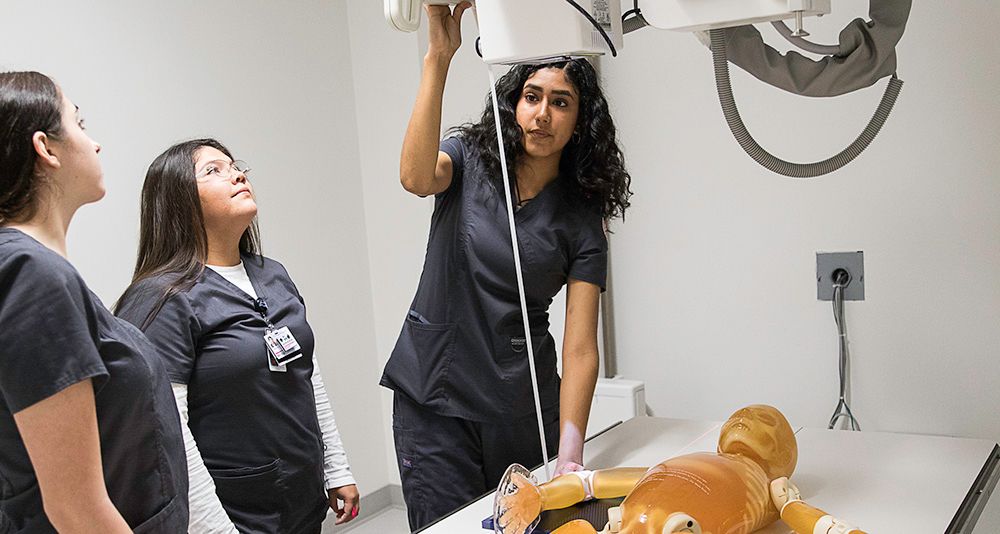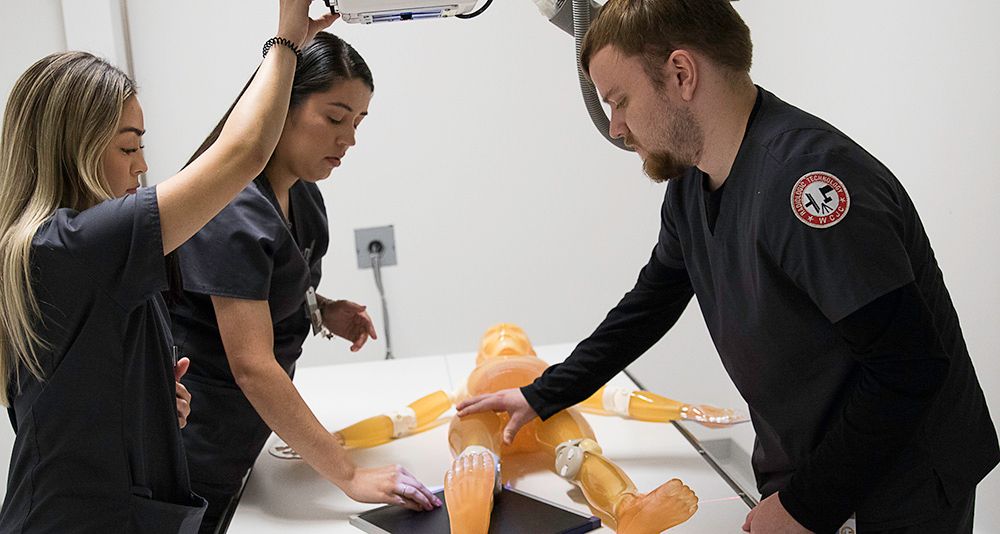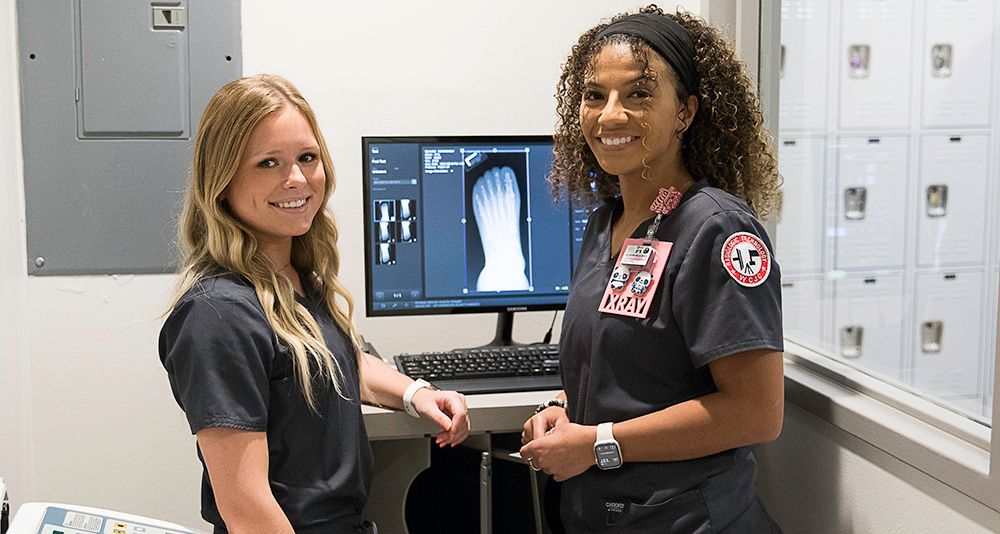
Are you looking to pursue a career in healthcare technology? Our Radiologic Technology program provides you with the knowledge and experience you need to become an entry-level radiologic technologist. Get practical, hands-on training through clinical rotations at affiliate hospitals/clinics in the surrounding areas.
Our 24-month program teaches you how to prepare patients for exams, explain X-ray procedures, and prepare patients for the radiologist. The program requires a large time commitment that requires you to attend classes at the Wharton campus or at your clinical practicum site Monday - Friday 8am - 5pm, with some evening and weekend clinical assignments required. After graduation, you may be eligible to sit for the ARRT Certification. Enrollment is limited to 18 students per year. Review the courses for the program in the Academic Maps:
Upon completing the program, you may be eligible to sit for the certification exam administered by the American Registry of Radiologic Technologists (ARRT) and to apply for state licensure through the Texas Medical Board. You will need to check other states for their licensure requirements. After passing the exam, you will be prepared for an entry-level position as a radiologic technologist in hospitals, clinics, and imaging centers. With additional training, you can gain certification in the following modalities:
Find more information, including salaries and education requirements, on Career Coach!
A.A.S. Degree: 20 Hours General Education Courses Excluded (Includes 44 credits of
RADR courses):
Year 1:



Ms. Walker received her certificate in radiography from Scenic Mountain Medical Center School of Radiography in 1993 and worked as a staff technologist at DeTar Hospital in Victoria, TX. While a staff technologist, she earned advanced mammography and quality management qualifications. In 1999 she earned her B.S.R.S in Radiological Science from Midwestern State University and began teaching at Citizens Medical Center School of Radiography, where she remained Program Director until 2003. Mrs. Walker has been a full-time department head and instructor of Radiologic Technology for Wharton County Junior College since 2003. She earned her M.S.R.S. in Radiologic Science in 2007 from Midwestern State University.
Office: Wharton Campus, Johnson Building 206-D
Phone: (979) 532-6379
Email: sharlaw@wcjc.edu
Ms. Randel earned her A.A.S. in Radiologic Science from Wharton County Junior College in 2003. She was a staff technologist at West Houston Medical Center and Oak Bend Medical Center until 2007 when she became a full-time radiology instructor and clinical coordinator at Wharton County Junior College. Ms. Randel earned a B.S. R.S. in Radiological Science from Midwestern State University in 2008.
Office: Wharton Campus, Johnson Building 115
Phone: (979) 532-6380
Email: randela@wcjc.edu
Ms. Gurecky graduated from Wharton County Junior College in 2005 with an Associate of Applied Science degree in Radiologic Technology. After graduating, she worked for South Texas Medical Clinics-El Campo as a full-time technologist for 6 years, as well as a PRN technologist at Gulf Coast Medical Center for 3 years, simultaneously. During her time at Gulf Coast Medical Center, she was trained in CT. In 2011, she began working for Jackson County Hospital where she primarily worked independent nights and weekends, enhancing her skills in both CT and trauma. In the Spring of 2023, she moved into her first teaching role at Wharton County Junior College as a part-time instructor of Radiology. Ms. Gurecky obtained her bachelor's degree from the University of Houston-Downtown in 2023.
Office: Wharton Campus, Johnson Building 108
Phone: (979)532-6320
Email: Gureckya@wcjc.edu
Consistent with the mission of Wharton County Junior College, the Radiography Program will graduate students with an Associate of Applied Science. The program will afford the opportunity for individual growth, application of knowledge, and articulation to a baccalaureate degree program in the pursuit of continuous knowledge. Upon graduation from the program, the student will have the clinical, problem-solving, and communication skills equal to that of an entry-level radiologic technologist able to meet the needs of our community.
In fulfilling our mission statement, at the end of our program, students will:
In fulfilling our mission statement, the program will graduate an adequate amount of students to meet the needs of our community.
Program Effectiveness Data (available at www.JRCERT.org)
Archived Administrative Master Syllabi
The program is accredited by:
Joint Review Committee on Education in Radiologic Technology (JRCERT)
20 N. Wacker Drive, Suite 2850
Chicago, IL 60606
1 (312) 704-5300
www.jrcert.org
The Radiography Program is a six-semester, full-time program beginning each year's fall semester. Classes are held at the Wharton campus, and the program's clinical component is conducted in various hospitals and medical facilities affiliated with WCJC. Collectively the clinical affiliates provide a sufficient number and variety of radiologic procedures to offer students a well-balanced supervised clinical experience. Hours of clinical rotations are generally from 8am to 4:30pm (varies with semester). Students must complete alternate shifts (one 3pm-11pm, one 11pm-7am, and one weekend) beginning the summer of the first year and the fall semester of the second year. The entire semester clinical schedule will be posted before the beginning of the semester. Sites are located up to 76 miles from the Wharton main campus. Transportation to and from these sites is the student's responsibility. Note: A criminal background check and drug screen are required for all clinical sites. Specifics on fees needed can be found in the college catalog. Students will be given procedures and due dates upon acceptance into the program.
In the second year, students will rotate into other modalities such as CT, MRI, Radiation Therapy, and Cath Lab.
The following is a list of area medical facilities that have agreed to provide clinical experiences for our Radiography students. Assignment to one of these facilities is determined by the Program Director/Clinical Coordinator once the student is accepted into the program.
The program's policy regarding student clinical rotations in mammography (which may be applied to any imaging procedures performed by professionals who are of the opposite gender of the patient) is based on the sound rationale presented in a position statement on student clinical mammography rotations adopted by the Board of Directors of the Joint Review Committee on Education in Radiologic Technology ( JCERT) at its April 2016 meeting. The JRCERT position statement is available on the JCERT Website, www.jrcert.org, Programs & Faculty, Program Resources.
WCJC Radiography Program Policy: All male and female students will be offered the opportunity to participate in clinical mammography rotations. The program will make every effort to place a male student in a clinical mammography rotation if requested; however, the program needs to be in a position to override clinical setting policies that restrict clinical experiences in mammography to female students. Male students are advised that a placement in a mammography rotation is not guaranteed and is subject to the availability of a clinical setting that allows males to participate in mammographic imaging procedures. The program will allow female students to participate in mammography rotations in clinical settings that are not available to provide the same opportunity to male students.